Social / Demographics
A Census for City Streets
Eric Scharnhorst, project manager at Gehl Architects, argues for a wide-scale census instrument detailing city life, not just pedestrian counts and fatalities.
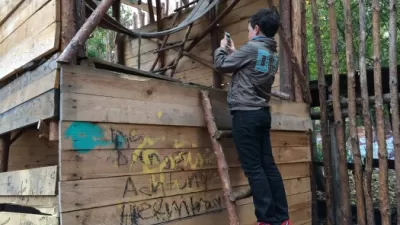
Berliner Kinder: Berlin and its 'Playborhoods'
Are you thinking about playborhoods, playsheds, and free-range kids? Berlin's Kolle 37 hits it out of the park. Literally.
Pew Study: U.S. Cities Still Recovering from Recession
A new Pew Charitable Trusts report discusses the ongoing recovery of American cities from the 2008 Great Recession, more than five years after it officially ended.

Women Unwelcome in French Public Spaces
Suburban Paris plays host to a disturbing trend: no comfortable public spaces for women, especially for women from immigrant and low-income groups.
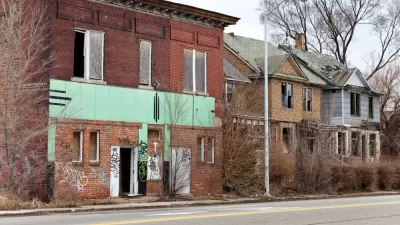
Explained: Vacancies, Population Decline, and the Importance of Household Size
Jason Segedy has published a long, brutally frank look at blight and vacant properties, especially at the underappreciated culprit for the woes of so many shrinking cities around the Rust Belt: household decline.
China's Baby Bust
When China relaxed its rigid one-child policy last November, health officials were expecting an additional two million births to result. As of Sept. 30, they have received only 804,000 applications from eligible couples.
Did Advocates Overreact to Bike Safety Report?
When I read the subtitle to the recent GHSA bike safety report, "Adult Males and Urban Environments Now Represent Bulk of Deaths," I took an interest as I fit that demographic. I was surprised to read here about the dispute that erupted from it.
How to Recover from a Poorly Attended Public Meeting
From the periphery, planning and community engagement seems easy. You schedule a few public meetings. You confer with a few experts and put together a plan for the future of a community. Easy? Nope.
Working Adults More Likely to Live with Roommates
Recent data by Zillow suggests that we might all soon be living like the Golden Girls (original author's joke).
Friday Eye Candy: New York Street Life in High Definition
A few minutes of the film "Street" by James Nares shows only a few seconds of life in New York City—but such poetry is found there.
Racial Inequalities Withholding $2.1 Trillion from U.S. GDP
A new study by PolicyLink and the University of Southern California's Program for Environmental and Regional Equity showed that U.S. GDP would expand by $2.1 trillion if racial minorities had equal access to opportunities within the job market.
An Interview with Kaid Benfield, Urban Resilience Guru
PlaceMakers asks Kaid to give us his idea of where we are in the effort to integrate smart growth strategies in the broadest sense into community planning and design.

Fighting Homelessness by Closing a Commuter Rail Station
The high desert city of Lancaster in northern Los Angeles County has an innovative plan to reduce its homeless population: Close its Metrolink station, the last stop on the Antelope Valley line, that serves 400 commuters daily.
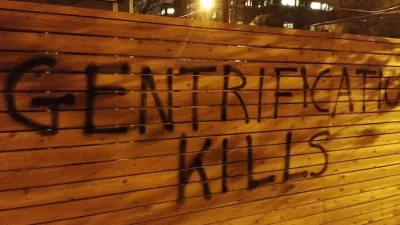
The False Choice in the Gentrification Debate
The income of original residents is more important to the gentrification debate than any opposition to luxury development or price controls. We need to begin to embed income inequality within the gentrification debate.
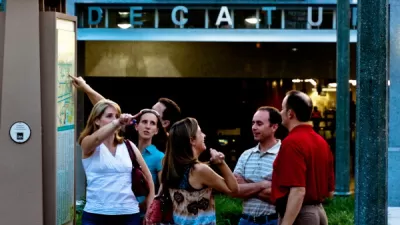
Majority of Americans Favor Funding for Transit Over Funding for Roads
In a poll conducted by ABC News and the Washington Post, Americans were found to prefer allocating transportation funding towards transit expansion rather than road widening.

Mapping the Skill Sets Unique to Cities
The skills and location data of over 175 million LinkedIn members were mined to produce a map displaying the industries most common in major cities throughout the United States and Europe.
Massive Detroit Foreclosures Push Out Black Homeowners
A Detroit reborn sounds great, but what if the residents of “blighted” areas don’t want to leave? Many feel they have no choice in a process that has been compared to racial relocation. Meanwhile, activists scramble to give residents options.
Rethinking the Spectrum of American Multi-Modality
A new study from Virginia Tech reclassifies what defines multi-modal commuters.
How Twitter Identifies Public Sentiment
Rebecca Tuhus-Dubrow asks the question of whether the data produced by Twitter could be used to understand and plan cities?
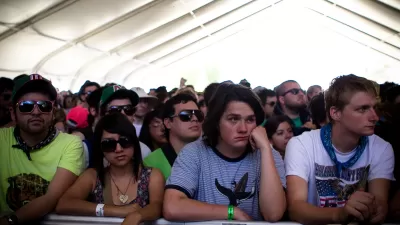
The 'Young and Restless' Choosing to Live in Cities
A report by new think tank City Observatory about where young college graduates are choosing to live inspired plenty of commentary this week.
Pagination
Urban Design for Planners 1: Software Tools
This six-course series explores essential urban design concepts using open source software and equips planners with the tools they need to participate fully in the urban design process.
Planning for Universal Design
Learn the tools for implementing Universal Design in planning regulations.
Gallatin County Department of Planning & Community Development
Heyer Gruel & Associates PA
JM Goldson LLC
City of Camden Redevelopment Agency
City of Astoria
Transportation Research & Education Center (TREC) at Portland State University
Jefferson Parish Government
Camden Redevelopment Agency
City of Claremont


































